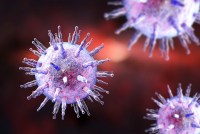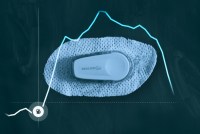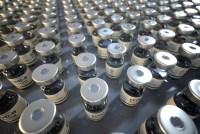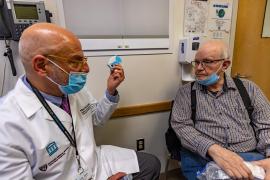Latest KFF Health News Stories
What Does a Chatbot Know About Eating Disorders? Users of a Help Line Are About to Find Out
The National Eating Disorders Association’s help line has seen demand climb to unsustainable levels since the beginning of the covid pandemic, with more people reporting severe mental health problems, the nonprofit says. But staffers worry this chatbot may make things worse.
KFF Health News' 'What the Health?': The Crisis Is Officially Ending, but Covid Confusion Lives On
The public health emergency declaration for covid-19 ends May 11, ushering in major changes in how Americans can access and pay for the vaccines, treatments, and tests particular to the culprit coronavirus. But not everyone will experience the same changes, creating a confusing patchwork of coverage — not unlike health coverage for other diseases. Meanwhile, outside advisers to the FDA formally recommended allowing a birth control pill to be sold without a prescription. If the FDA follows the recommendation, it would represent the first over-the-counter form of hormonal contraception. Margot Sanger-Katz of The New York Times, Tami Luhby of CNN, and Joanne Kenen of the Johns Hopkins Bloomberg School of Public Health and Politico join KFF Health News’ Julie Rovner to discuss these issues and more. Plus for “extra credit” the panelists suggest health policy stories they read this week they think you should read, too.
How One Patient’s Textured Hair Nearly Kept Her From a Needed EEG
An EEG can help diagnose conditions like epilepsy, sleep disorders, and brain tumors. But a design flaw and outdated Eurocentric practices make the test less effective on thicker, denser, and curly hair types, potentially excluding or deterring some people from getting screened.
Social Media Is Fueling Enthusiasm for New Weight Loss Drugs. Are Regulators Watching?
Online platforms are overflowing with testimonials for GLP-1s. The drugs show promise for inducing weight loss, but many aren’t FDA-approved for that use.
Feds Launch Criminal Investigation Into ‘AGGA’ Dental Device and Its Inventor
KFF Health News and CBS News recently reported that multiple lawsuits allege the device has led to grievous injuries to patients’ mouths, resulting in loss of teeth.
FDA Evaluates ‘Safety Concerns’ Over Dental Devices Featured in KHN-CBS Investigation
A KHN and CBS News investigation found that a dental appliance called the AGGA has been used by more than 10,000 patients, and multiple lawsuits allege it has caused grievous harm to patients.
A Secret Weapon in Preventing the Next Pandemic: Fruit Bats
New research links habitat destruction with the spillover of viruses from animals to humans.
Behavioral Telehealth Loses Momentum Without a Regulatory Boost
As flexible treatment options spurred by the covid pandemic wane, patients relying on medications classified as controlled substances worry that without action to extend the loosened rules, it’ll be harder to get their meds.
As STDs Proliferate, Companies Rush to Market At-Home Test Kits. But Are They Reliable?
The popularity of at-home covid tests has amplified calls from public health researchers and diagnostic companies to make home testing similarly routine for sexually transmitted diseases. But FDA guidelines are lagging.
Listen: How Does Human Composting Work?
California Healthline’s Bernard J. Wolfson went on the air to explain a new California law that will allow people to have their bodies reduced to compost after death, an alternative to the traditional-but-toxic methods of cremation and burial.
As Links to MS Deepen, Researchers Accelerate Efforts to Develop an Epstein-Barr Vaccine
Recent leaps in medical research have lent urgency to the quest to develop a vaccine against Epstein-Barr, a ubiquitous virus that has been linked to a range of illnesses, from mononucleosis to multiple sclerosis and several cancers.
You may have seen the ads that promise weight loss and better health — phone apps, rings, and other devices — by giving you data on how your body reacts to food, exercise, and sleep. Is this information enough to help consumers achieve their goals?
Genetic Tests Create Treatment Opportunities and Confusion for Breast Cancer Patients
Doctors are divided on whether blanket testing of breast cancer patients is warranted, since scientists and physicians are sometimes unsure about how to interpret the results.
Did the US Jump the Gun With the New Omicron-Targeted Vaccines?
With fears of a winter surge looming, government agencies have authorized and encouraged vaccination with a newly formulated booster. But the science to support that decision remains inconclusive.
Exploitative practices in medical research have contributed to the underrepresentation of Native people in clinical trials. Episode 10 explores the efforts of Indigenous scientists to rebuild this broken trust through tribally controlled research.
Covid Sewage Surveillance Labs Join the Hunt for Monkeypox
Wastewater testing has proved a reliable early alarm bell for covid outbreaks. U.S. researchers are now adapting the approach to track the explosive spread of monkeypox.
Health Care Startups Turn to ‘Coaches’ to Help Patients Cope and Monitor Treatment
The interest, and investment, in coaching and encouragement is a curious turn for an industry that likes to boast of its billion-dollar pills and sophisticated artificial intelligence.
Addressing the ‘Trust Factor’: South Carolina Researchers Tackle Health Disparities Using Genetics
A new genetic research project underway in South Carolina aims to reduce health disparities between Black and white residents — such as cancer and cardiovascular disease rates — that have long ranked among the nation’s worst. But researchers face the challenge of recruiting 100,000 participants who reflect the diversity of South Carolina. And history isn’t on their side.
High-Tech’s Business Model Hasn’t Worked for the Cue Covid Test
Cue got attention with a Super Bowl ad for a stylish high-tech covid-testing machine to use at home. But the product is expensive, which has limited the San Diego company’s market.
The Private Sector Steps In to Protect Online Health Privacy, but Critics Say It Can’t Be Trusted
Health data can be shockingly available. A group of nonprofits and corporations is proposing to patch up the holes in health apps, but many of the biggest companies didn’t participate in the proposal’s creation.


























